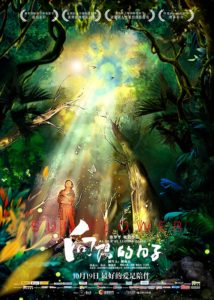Sun Flower
向阳的日子
China, 2017, colour/b&w, 2.35:1, 96 mins.
Director: Zhang Luoping 张罗平.
Rating: 6/10.
Well-packaged portrait of a father and son in rural China is short on originality and real drama.
The countryside in northern China, some 30 or more years ago. Ten-year-old Zhang Xiangyang (Hai’erfu) attends the funeral of his paternal grandmother Ouyang Delan (Yu Peng), who raised him when his father, Zhang Hengyuan (Wu Chao), remarried and promised his new wife that someone else would take care of the child. Zhang Xiangyang’s mother (Jin Xi) had died a year after he was born, so he remains devoted to his grandmother’s memory. Now, however, his father insists on taking him back in, despite opposition from his second wife, Peng Huijuan (Wang Like), with whom he’s had two children. Zhang Xiangyang has a distant relationship with his father and doesn’t know either his step-mother, younger step-sister (Yan Jiayin) or step-brother (Zhang Bowei). To welcome Zhang Xiangyang to the house, his father paints the walls of his bedroom with sunflowers, after which he got his given name Xiangyang (“Facing the Sun”). As his father is his only friend, their relationship grows, though his father spends a lot of time away in town working as a sign painter. Zhang Xiangyang takes an interest in calligraphy and his school decides to enter him in a competition. But the whole affair ends badly when Zhang Xiangyang doesn’t turn up. Despite other tensions, Zhang Hengyuan teaches his son to draw, and the latter asks him for a portrait of his late mother who was reputedly very beautiful. Meanwhile, Zhang Xiangyang gets to know Liu Xiaoyong (Lv Yulai), his late mother’s younger brother, who is something of a wastrel.
REVIEW
A father-and-son heartwarmer set in a beautiful stretch of countryside, Sun Flower 向阳的日子 passes the time agreeably, is professionally packaged at every level, but doesn’t win many points for originality. A first feature by Hunan-born Zhang Luoping 张罗平, a fine-arts graduate who was a fashion photographer for a decade before he enrolled in the directing course at Beijing Film Academy in 2014, it’s stronger on look than drama: even after suddenly changing direction at the 60-minute mark, it doesn’t fulfil the promise thrown up. With its generally light, sometimes comic tone, this is an undemanding entry in a familiar genre that could have stood out from the pack with a few more re-writes.
Seemingly deliberately, Zhang and co-writer Pei Pei 佩佩 set the film in a timeless world that simply evokes childhood days, with no context. The main location is a house in the middle of gently rolling, eternally summery landscape in what looks like somewhere in northern China (the film was actually shot in Inner Mongolia province). Wall posters in town show a range of films from the early 1960s to early 1980s; all things considered, the setting looks something like the latter. But at the end of the day, time and place are not really important, as the story’s dramatic elements are all generated internally rather than by outside events.
As a 10-year-old boy tries to fit in with his father’s new wife and family, the story proceeds in familiar, episodic style, with a catty step-mother, a breezy father and various ups-and-downs. Playing by young newcomer Hai’erfu 海尔夫, with a steely look and old-style newsboy hat, is strong and, as the ever-optimistic father, character actor Wu Chao 吴超 is equally good, creating a complicity between the two that hints that the elder’s unconventional nature is gradually being passed down the family line. Between the two leads, TV actress Wang Like 王力可 doesn’t overplay the step-mother’s cattiness, making her change of attitude more believable. In smaller roles, indie regular Lv Yulai 吕聿来 (Trap Street 水印街, 2013; Blue Amber 淡蓝琥珀, 2018) is likeable as an easygoing outcast, while actress Jin Xi 金喜 is visually striking in flashbacks as the boy’s late mother. In general the acting is all very solid, without being special in any way.
Attractively shot by d.p. Huang Shaohui 黄绍辉, the film doesn’t grandstand its technical proficiency: Zhang favours fixed compositions, though not in a pretentious way, and even a complex four-minute single take centred on the father and son on a roof doesn’t advertise its cleverness. It’s soon after that sequence that the biggest dramatic shift takes place, as the step-mother’s attitude changes towards her step-son. If the script had met the challenge of resolving family tensions via that route, the film could have gained an extra point for originality; instead, it takes a much more conventional path that doesn’t build a head of dramatic steam.
The western-style score, credited to Paris-based sound engineer Yun Xie-Loussignian 谢云 and Mainland composer Liu Sijun 刘思军, is warmly effective without being lachrymose – typical of Liu’s style (Dam Street 红颜, 2005; A Deux World 旗, 2015; A Paper Marriage 一纸婚约, 2017). The film’s Chinese title is a word-play on the main character’s given name, meaning both “Xiangyang’s Days” and “Days Facing the Sun”. Local box office was a microscopic RMB225,000.
CREDITS
Presented by Beijing Lucid Dreamers Culture Media (CN), Beijing Lingshang Zhaoyang Culture Media (CN). Produced by Beijing Lucid Dreamers Culture Media (CN).
Script: Zhang Luoping, Pei Pei. Photography: Huang Shaohui. Editing: Guan Shuai. Music: Yun Xie-Loussignian, Liu Sijun. Art direction: Fan Jieming. Sound: Yun Xie-Loussignian, Zhang Yang. Visual effects: Orinig Vfx. Executive direction: Qu Zhixin.
Cast: Wu Chao (Zhang Hengyuan, father), Hai’erfu (Zhang Xiangyang, first son), Wang Like (Peng Huijuan), Song Tao (Zhang Hengsheng), Cui Nan (Zhang Hengsheng’s wife), Zhang Zilin (Zhang Hengsheng’s daughter), Lv Yulai (Liu Xiaoyong), Jin Xi (Zhang Hengyuan’s first wife), Zhang Bowei (Zhang Xiangnan, second son), Yan Jiayin (daughter), Yu Peng (Ouyang Delan, grandmother), Alatangsuhe (San), Le Sihong (Lai Dabao), Xu Xin (fat schoolboy), Cai Tingchao (schoolmaster), Chen Chen (Chen, schoolteacher), Luo Haifu (postman), Wang Huiqun (bath-house owner), Chang Shouyin (bath-house owner’s wife).
Premiere: Auburn Film Festival for Children & Young Adults, Sydney, Sep 2017.
Release: China, 19 Oct 2018.
